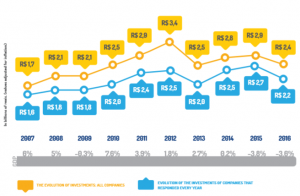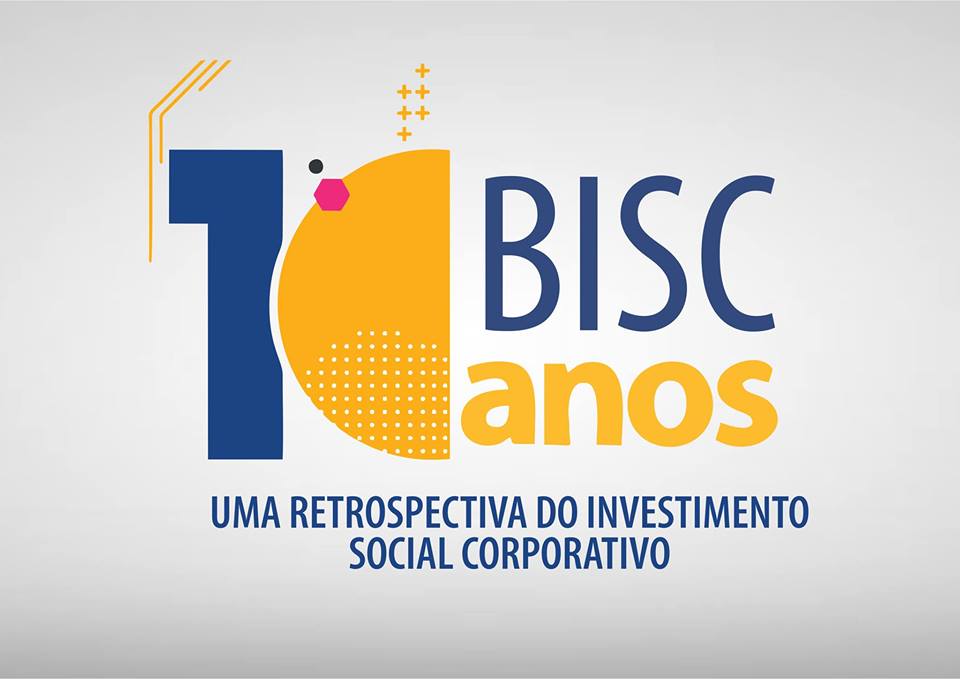In December 2017, Comunitas, a civil society organization based in São Paulo, and the Brazilian Local Authority of the Global Exchange led by CECP, published the 10th edition of The Corporate Social Investment Benchmarking (or BISC, Benchmarking do Investimento Social Corporativo in Portuguese), a comprehensive overview of the achievements in this space over the last ten years.
Created in 2008, and inspired by the work of CECP: the CEO Force for Good, BISC research has been expanding its strategic objectives, aiming to operate as a tool for managing corporate social investments in Brazil. Each year, new subjects are incorporated, bringing important insights to rethink and redefine companies’ directions on how they are investing and prioritizing strategically.
The 10th anniversary edition of BISC report is an important milestone, as it follows the evolution that corporate social investment has had in Brazil. The research successively improved and expanded and is now a tool that supports companies’ social performance.
BISC’s respondents’ group consists of 268 companies and 18 business institutes and foundations. Survey participants provided a detailed inventory of all resources (financial, goods and services) invested by companies in projects and activities of social interest. To understand the changes that occurred over a ten-year period, this year’s anniversary report analyzed the main results obtained in previous editions and sought to identify four key benchmarks: 1) changes in the profile of grantees; 2) the progress that has been made; 3) the current challenges; 4) and the road to future improvements. And most importantly, in this year’s edition, we challenged companies to offer their suggestions for the future of CSI and understand the lessons learned to accelerate necessary changes.
Despite fluctuations in the economic climate and last year’s recession, both of which likely contributed to a 19% drop in the volume of funds invested in 2016, companies maintained their investments at a high-level giving R$ 2,4 billion (about US$754 million[1]) to social programs. This figure represents a 35% growth compared to 2008, the first year of the study. This growth also highlights the consolidation of the corporate sector’s performance in the social field.

BISC’s objective is to not only produce quality statistical data, but also to raise awareness of new CSI topics, and to guide adequate social practices and consolidate performance standards that stimulate the growth of these practices.
When responding to the BISC survey questionnaire, managers are encouraged to reflect on their company’s social performance, identify alternative work strategies, and map their challenges and opportunities for the future.
BISC’s results are useful for companies to benchmark against the behavior patterns of corporate peers; make decisions about social budgets; monitor and evaluate the evolution of their social investments over time; and contribute to the production and dissemination of knowledge on the subject.
One important achievement of this research is the creation of the “Debates Group”, an opportunity to bring together corporate leaders in the social field. Since its creation in 2015, seven meetings have been held hosting several partners who are dedicated to produce knowledge on issues of collective interest and whose results are highlighted in the annual reports.

In addition to that, in 2012 Comunitas created the Juntos Program. Juntos aims at promoting a more systemic impact through the qualification of corporate social investments in a work developed in partnership with public administrations at the municipal level.
Another important insight from the BISC report is that the funds invested are mostly private. In the past two years, for example, tax incentives accounted for only 19% of the total amount invested by the group. And the investment pattern of the companies participating in the research is compatible with the international standard captured in the Giving in Numbers report, considering the participation of social investments in the companies’ gross profit.
To face these new challenges, companies have dedicated themselves to redesigning social investment management strategies, seeking to qualify teams, adjusting management mechanisms, broadening the dialogue with stakeholders and getting closer to communities.
All these efforts are reflected in the improvement of the quality standard of social practices, as captured in the research. But the changes initiated in this period have not yet been completed. The group recognizes that there is much left to be done and those challenges are not trivial. There is no room for accommodation and companies emphasize the increasing need to innovate, scale and measure results.
It is up to the BISC to continue striving to assist them in this process. Even though we know that the journey is long, we will go forward together in search of new milestones for the next few years.

[1] According to the average exchange rate of US$3,184 each R$1,00


